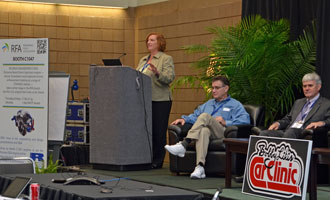 A panel consisting of an automotive technician, an automotive engineer and an ethanol industry representative had the opportunity to bust some myths about ethanol at the National Automotive Service Task Force meeting in New Orleans on Saturday.
A panel consisting of an automotive technician, an automotive engineer and an ethanol industry representative had the opportunity to bust some myths about ethanol at the National Automotive Service Task Force meeting in New Orleans on Saturday.
Renewable Fuels Association Director of Regulatory Affairs Kelly Davis, Ricardo Chief Engineer for powertrain controls Dr. Matti Vint, and automotive talk show host/service center owner Bobby Likis each addressed one myth about ethanol related to the vehicle industry.
Vint busted the myth that ethanol ruins engine performance by detailing the benefits of the fuel’s higher octane rating, which is a measure of its anti-knock properties. “The higher octane, the higher the cylinder pressure you can operate without causing destructive damage to the engine,” he said. “So high octane is good for extracting the maximum performance of the engine and improving the efficiency.” He explained how designing engines like the Ricardo EBDI (Extreme Boost Direct Injection) engine will better utilize ethanol’s higher octane rating.
Likis busted the myth that ethanol poses repair and service problems. “In the 41 years I’ve been in the automotive service business, I’ve never had a single engine fail as a result of ethanol,” he said, noting that engines have been designed to run on E10 for the past 30 years.
Finally, Davis busted the myth that consumers don’t want choice at the pump. “A recent survey complete by American Viewpoint showed 61% were in favor of replacing imported fossil fuel dependency with renewable fuels like ethanol,” Davis said, pointing out that the approval of E15 allows more options for model year 2001 and newer vehicles.
Listen to the panel presentations here: Ethanol Myth Busters Panel
Watch Dr. Matti Vint’s presentation below:
CARS Event Photo Album

